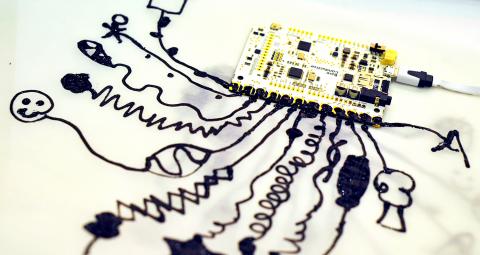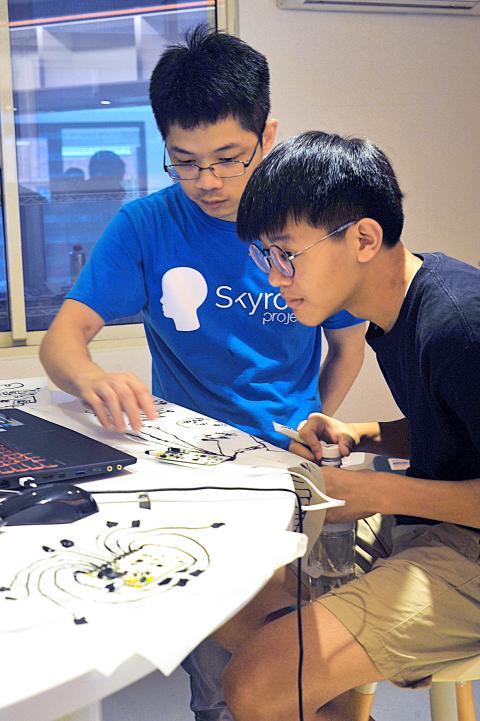Yu Kai-ming (余凱明) is having fun making paintings talk while his classmates are stuck in summer cram school.
The junior high school student is spending his summer at Skyrock Projects, an academy for “creative technologists” where students create video games that respond to the players’ pulses or set up systems to maintain and monitor an urban garden.
Yu likes the lively atmosphere with lots of interaction between teachers and students. He also takes computer classes at school, but there they just “stare at the teacher” while following the same tutorial for a certain program.

Photo: Han Cheung, Taipei Times
“I’m learning faster this way,” he says.
Yu invited his friends to join him, but their parents wouldn’t allow it as high school entrance exams loom next year.
As a new business that has been open for less than a month, cofounder Simon Thomas faces the task of selling his program to parents who are primarily concerned about their children’s test scores. His goal is to give students a boost in creativity and critical thinking, which he believes are not only lacking in the local curriculum but also Western-style international schools.

Photo: Han Cheung, Taipei Times
“Our biggest job is to convince [parents] that a [creative] portfolio carries just as much weight as a transcript,” he says. “If it doesn’t now, it will in the future.”
BORN FROM FRUSTRATION
Thomas and cofounder Tony Cornes both left their jobs as Taipei European School high school teachers because they felt that the set curriculum didn’t provide enough room to design long-term creative programs. They opened Skyrock Projects, which features an original curriculum, as a supplement to formal schooling,
“Usually companies start the same way — with a frustration,” Thomas says.
While this lack of creativity and critical thinking is more pronounced in local education, Thomas says it is a global phenomenon. Not only is creativity hard to teach, it’s also hard to quantify as the lessons are often unstructured with unpredictable outcomes.
“It’s really hard to standardize subjectivity,” he says. “Until we can design assessment materials or have enough faith in the system that we don’t need to standardize it, there will always be a dearth … of [programs] that prioritize a creative outcome over one that is accurate and correct.”
Thomas believes that creative thinking will ultimately help the students learn faster, but unlike cram schools, he can’t guarantee the parents that their children will achieve better scores. He says it is even a harder sell for adults, who ask how the program can improve their careers or help land their dream jobs.
“There’s no guarantee,” Thomas says. “But you can develop a portfolio that says, ‘Here’s my ability to have original thought and execute something that hasn’t been done before. Do you need this skill in your office?’”
CREATIVE CONFIDENCE
To be successful at Skyrock Projects, the students need to develop what Thomas calls “creative confidence.”
“You can do whatever you want,” Thomas says. “For someone to be able to look at a blank page, see nothing, and devise a plan … form a strategy and execute. That’s a really powerful thing people don’t get taught in school,” Thomas says.
This week, the students are working with conductive paint. One group has drawn a floor plan of the school and connected it to a laptop via a computer board. Their goal is to make the laptop play a descriptive audio clip whenever someone presses a room on the floor plan.
Last week focused on creating games involving human biological functions. Among the results was a Memory game where players would lose points for pressing too hard on the controls. in another, players physically jump up and down to avoid obstacles but the game gets harder as the player’s pulse speeds up.
Classes are offered in English, English with Mandarin assistance and Mandarin, and the students are a mix from international, alternative and local schools. Communication is essential as the students work closely with the teacher and each other. They are also recorded presenting their work at the end of each session.
There are no textbooks, and Cornes says that teachers may not turn on classroom projectors for days.
“What we do is not about the teacher. It’s about what you’re doing as an individual. The pace of which you work is determined by your skill,” he says.
And this means that there’s no room for slacking off.
“You have to stay engaged,” Cornes says. “There’s no hiding. If you pause, you get left behind. In a conventional class, you can still get notes from somewhere else.”

On April 26, The Lancet published a letter from two doctors at Taichung-based China Medical University Hospital (CMUH) warning that “Taiwan’s Health Care System is on the Brink of Collapse.” The authors said that “Years of policy inaction and mismanagement of resources have led to the National Health Insurance system operating under unsustainable conditions.” The pushback was immediate. Errors in the paper were quickly identified and publicized, to discredit the authors (the hospital apologized). CNA reported that CMUH said the letter described Taiwan in 2021 as having 62 nurses per 10,000 people, when the correct number was 78 nurses per 10,000

As we live longer, our risk of cognitive impairment is increasing. How can we delay the onset of symptoms? Do we have to give up every indulgence or can small changes make a difference? We asked neurologists for tips on how to keep our brains healthy for life. TAKE CARE OF YOUR HEALTH “All of the sensible things that apply to bodily health apply to brain health,” says Suzanne O’Sullivan, a consultant in neurology at the National Hospital for Neurology and Neurosurgery in London, and the author of The Age of Diagnosis. “When you’re 20, you can get away with absolute

May 5 to May 11 What started out as friction between Taiwanese students at Taichung First High School and a Japanese head cook escalated dramatically over the first two weeks of May 1927. It began on April 30 when the cook’s wife knew that lotus starch used in that night’s dinner had rat feces in it, but failed to inform staff until the meal was already prepared. The students believed that her silence was intentional, and filed a complaint. The school’s Japanese administrators sided with the cook’s family, dismissing the students as troublemakers and clamping down on their freedoms — with

As Donald Trump’s executive order in March led to the shuttering of Voice of America (VOA) — the global broadcaster whose roots date back to the fight against Nazi propaganda — he quickly attracted support from figures not used to aligning themselves with any US administration. Trump had ordered the US Agency for Global Media, the federal agency that funds VOA and other groups promoting independent journalism overseas, to be “eliminated to the maximum extent consistent with applicable law.” The decision suddenly halted programming in 49 languages to more than 425 million people. In Moscow, Margarita Simonyan, the hardline editor-in-chief of the